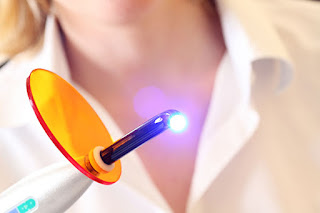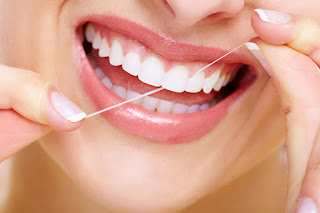Oral surgery is easier than ever with our laser dentistry technology.
You will experience a less invasive surgery with fewer possible side
effects and a faster recovery time. Our lasers use an intense beam of
light and heat to perform detailed procedures without harming the
surrounding teeth and oral tissues. Since the beginning of laser use in
the late 1980’s, the laser dentistry technology has become more powerful
than ever, providing trusted and long-lasting results.
Benefits of Laser Therapy, aka Laser Dentistry
Like
mentioned above, laser dentistry allows for a fast recovery time and a
less invasive surgery for patients. This provides convenience and less
chair time for each patient. Many of our laser treatments do not require
anesthesia which allows patients to leave our office directly following
surgery without feeling hesitant or nervous about driving with an
anesthetic in their system. Even though they leave your system quickly
following a procedure and are completely safe, many people are still
wary of the option. Also, because our laser treatments are so precise,
there is a lower chance of bacterial infection developing. There is also
less possibility of scar tissue developing or bleeding and swelling
following surgery. With all of these benefits, our patients go into
their oral surgery comfortably with their minds at complete ease.
Types of Laser Dentistry
There
are two main types of laser dentistry that branch out into multiple
types of procedures. There is hard tissue laser dentistry and soft
tissue laser dentistry. Hard tissue laser therapy includes treatment of
cavity detection and removal, as well as the application of dental
fillings. This type of laser dentistry is used to improve sensitivities
in teeth and to perform an alternative root canal therapy to the classic
methods.
The second type of laser dentistry is soft tissue
laser therapy. When your gums need reshaping, redirecting, or general
gum surgery, we can use soft tissue laser dentistry as a less invasive
option to those performed using traditional dental tools. We can also
provide you with a muscle attachment improvement, oral lesion or tumor
removal, biopsies, periodontal disease treatment, removal of bacteria
from below your gum line, and sleep apnea treatment with the use of
laser dentistry. These are all considered soft tissue laser dentistry.
Where Laser Dentistry Cannot Be Used
Although
there are many areas of oral surgery and general non-invasive
procedures in which laser dentistry can be used, there are a few areas
in which it cannot. The additional use of polishing tools may be needed
to finish off fillings in order to create a smooth surface. Shaping
tools may also be employed. Laser dentistry may not be used around some
already placed fillings and crowns.
Our office has found that
laser dentistry is more useful and versatile than many realize. For
those suffering from anxiety when faced with traditional tools, laser
dentistry is a safe and viable option that may produce less fear in
patients. Our laser dentistry technology is advanced and can perform
smooth and successful oral surgery. Contact our office to learn more
about this state-of-the-art technology.
Tuesday, June 23, 2015
Wednesday, June 3, 2015
Learn How to Prevent Gum Recession
Having gum recession can be frustrating, aesthetically unpleasant,
and detrimental to your oral health. If you have started noticing signs
of gum recession, or you just want to ensure that it never develops, we
have some tips that might be helpful for you to begin utilizing.
• Visit the dentist.
It may sound like an obvious solution, but many people avoid visiting the dentist on a regular basis. This prevents them from realizing when they may be at risk for gum recession. When you visit a dentist for an appointment, we can notify you if we notice any signs of recession or gum disease. We can also direct you to changes that need to be made to your oral hygiene regimen. This can be invaluable information when you are trying to prevent detrimental and unsightly gum recession.
• Adjust your brushing habits.
When you use a toothbrush that is too hard or puts too much pressure on your teeth and gums when you brush, you are weakening your oral tissues. Aggressive brushing habits may seem like a good idea to deter plaque from developing, but they are actually making your teeth and gums more vulnerable to other problems like gum recession and tooth loss. Brush your teeth with a firm, but gentle pressure and circular motion. If you have been using a toothbrush with hard bristles, you may also consider getting medium or soft grade bristles.
• Over flossing may be the culprit.
Flossing is a wonderful habit to have, but when you over floss, you could be weakening your gums. Flossing removes plaque, but once you have flossed once or twice a day, you should avoid doing so anymore unless you have something stuck in your teeth. Flossing too much puts unnecessary pressure on your gums and may encourage them to recede.
• It may be in your genes.
Unfortunately, you may just have an inherited predisposition for thin gums and gum recession. If this is the case, you should definitely be brushing more gently, and you should consider having a gum graft before your gum recession becomes severe.
• Biting your nails, pencils, or any other foreign objects.
If you have the habit of putting objects into your mouth to chew on, you may also be scratching your gums without noticing. You should already be trying to stop these biting habits as they are bad for your dental enamel, but they can also lead to gum recession.
• Periodontal disease could be to blame.
Periodontal disease, a severe form of gum disease, is the main culprit of gum recession. To avoid developing periodontal disease, practice proper oral hygiene and visit a dentist at least twice a year for check-ups and cleanings.
Once you form these habits, you should be on the road to better oral health and less likelihood of developing gum recession. Also, keep in mind that you should visit your dentist every 3-6 months if you think your gums may already be receding. A dentist will be able to keep an eye on the amount of gum tissue you are losing. We can also perform a gum graft as needed and help with extreme cases of gum recession.
• Visit the dentist.
It may sound like an obvious solution, but many people avoid visiting the dentist on a regular basis. This prevents them from realizing when they may be at risk for gum recession. When you visit a dentist for an appointment, we can notify you if we notice any signs of recession or gum disease. We can also direct you to changes that need to be made to your oral hygiene regimen. This can be invaluable information when you are trying to prevent detrimental and unsightly gum recession.
• Adjust your brushing habits.
When you use a toothbrush that is too hard or puts too much pressure on your teeth and gums when you brush, you are weakening your oral tissues. Aggressive brushing habits may seem like a good idea to deter plaque from developing, but they are actually making your teeth and gums more vulnerable to other problems like gum recession and tooth loss. Brush your teeth with a firm, but gentle pressure and circular motion. If you have been using a toothbrush with hard bristles, you may also consider getting medium or soft grade bristles.
• Over flossing may be the culprit.
Flossing is a wonderful habit to have, but when you over floss, you could be weakening your gums. Flossing removes plaque, but once you have flossed once or twice a day, you should avoid doing so anymore unless you have something stuck in your teeth. Flossing too much puts unnecessary pressure on your gums and may encourage them to recede.
• It may be in your genes.
Unfortunately, you may just have an inherited predisposition for thin gums and gum recession. If this is the case, you should definitely be brushing more gently, and you should consider having a gum graft before your gum recession becomes severe.
• Biting your nails, pencils, or any other foreign objects.
If you have the habit of putting objects into your mouth to chew on, you may also be scratching your gums without noticing. You should already be trying to stop these biting habits as they are bad for your dental enamel, but they can also lead to gum recession.
• Periodontal disease could be to blame.
Periodontal disease, a severe form of gum disease, is the main culprit of gum recession. To avoid developing periodontal disease, practice proper oral hygiene and visit a dentist at least twice a year for check-ups and cleanings.
Once you form these habits, you should be on the road to better oral health and less likelihood of developing gum recession. Also, keep in mind that you should visit your dentist every 3-6 months if you think your gums may already be receding. A dentist will be able to keep an eye on the amount of gum tissue you are losing. We can also perform a gum graft as needed and help with extreme cases of gum recession.
Subscribe to:
Comments (Atom)

